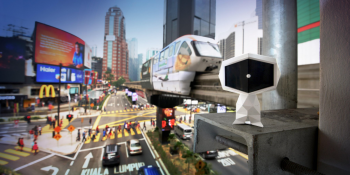
The City Brain by Alibaba Cloud, which is being carried out on a trial basis in Kuala Lumpur, is expected to be rolled out to other parts of Malaysia after its pilot project is completed.
The Malaysia City Brain initiative, carried out in collaboration with the Malaysia Digital Economy Corporation (MDEC) and the Kuala Lumpur City Hall, is a significant milestone as it’s the first time for the solution to be adopted overseas.
City Brain is developed on Alibaba Cloud’s robust cloud computing infrastructure and will support Malaysia’s digital transformation with cloud technology and artificial intelligence.
Alibaba Cloud president Simon Wu said that every city faced similar problems especially in terms of traffic woes, and the City Brain was aimed at shaping a more modern and convenient transportation system.
“The scale of network is expanding rapidly, but traffic demand varies in space and time,” he said during the Alibaba Cloud Conference in Hangzhou, China, today.
Wu said that by leveraging on cloud computing and artificial intelligence, the system could collect data from the traffic pattern, hence improving the city’s management system, especially in transportation.
The City Brain in Kuala Lumpur, announced last year, is currently monitoring and collecting data on traffic movement especially around the city centre.
The rollout was in collaboration with ride-hailing application Grab and MDEC.
Meanwhile in Hangzhou, where the city brain was first implemented in 2017, the programme is now moving into the second phase.
“Traffic in the city has improved tremendously since the implementation and has reduced emergency response time. The City Brain will also centralise information on energy, construction and emergency rescue,” he added.
The programme will encompass five core elements, namely 5G networks, high positioning system, high precision driving map, electronic signs, traffic operation and control centre and integrated application, all aimed at creating a smart expressway.
He added that it would be more economical if the sensor that captured traffic flow was installed to the infrastructure rather than installing it in individual cars.
“In order for a city to transform, it needs to have the support from infrastructure. If not, it would be a waste,” Gang added.
 (0)
(0) (0)
(0)Archive
- October 2024(44)
- September 2024(94)
- August 2024(100)
- July 2024(99)
- June 2024(126)
- May 2024(155)
- April 2024(123)
- March 2024(112)
- February 2024(109)
- January 2024(95)
- December 2023(56)
- November 2023(86)
- October 2023(97)
- September 2023(89)
- August 2023(101)
- July 2023(104)
- June 2023(113)
- May 2023(103)
- April 2023(93)
- March 2023(129)
- February 2023(77)
- January 2023(91)
- December 2022(90)
- November 2022(125)
- October 2022(117)
- September 2022(137)
- August 2022(119)
- July 2022(99)
- June 2022(128)
- May 2022(112)
- April 2022(108)
- March 2022(121)
- February 2022(93)
- January 2022(110)
- December 2021(92)
- November 2021(107)
- October 2021(101)
- September 2021(81)
- August 2021(74)
- July 2021(78)
- June 2021(92)
- May 2021(67)
- April 2021(79)
- March 2021(79)
- February 2021(58)
- January 2021(55)
- December 2020(56)
- November 2020(59)
- October 2020(78)
- September 2020(72)
- August 2020(64)
- July 2020(71)
- June 2020(74)
- May 2020(50)
- April 2020(71)
- March 2020(71)
- February 2020(58)
- January 2020(62)
- December 2019(57)
- November 2019(64)
- October 2019(25)
- September 2019(24)
- August 2019(14)
- July 2019(23)
- June 2019(54)
- May 2019(82)
- April 2019(76)
- March 2019(71)
- February 2019(67)
- January 2019(75)
- December 2018(44)
- November 2018(47)
- October 2018(74)
- September 2018(54)
- August 2018(61)
- July 2018(72)
- June 2018(62)
- May 2018(62)
- April 2018(73)
- March 2018(76)
- February 2018(8)
- January 2018(7)
- December 2017(6)
- November 2017(8)
- October 2017(3)
- September 2017(4)
- August 2017(4)
- July 2017(2)
- June 2017(5)
- May 2017(6)
- April 2017(11)
- March 2017(8)
- February 2017(16)
- January 2017(10)
- December 2016(12)
- November 2016(20)
- October 2016(7)
- September 2016(102)
- August 2016(168)
- July 2016(141)
- June 2016(149)
- May 2016(117)
- April 2016(59)
- March 2016(85)
- February 2016(153)
- December 2015(150)
